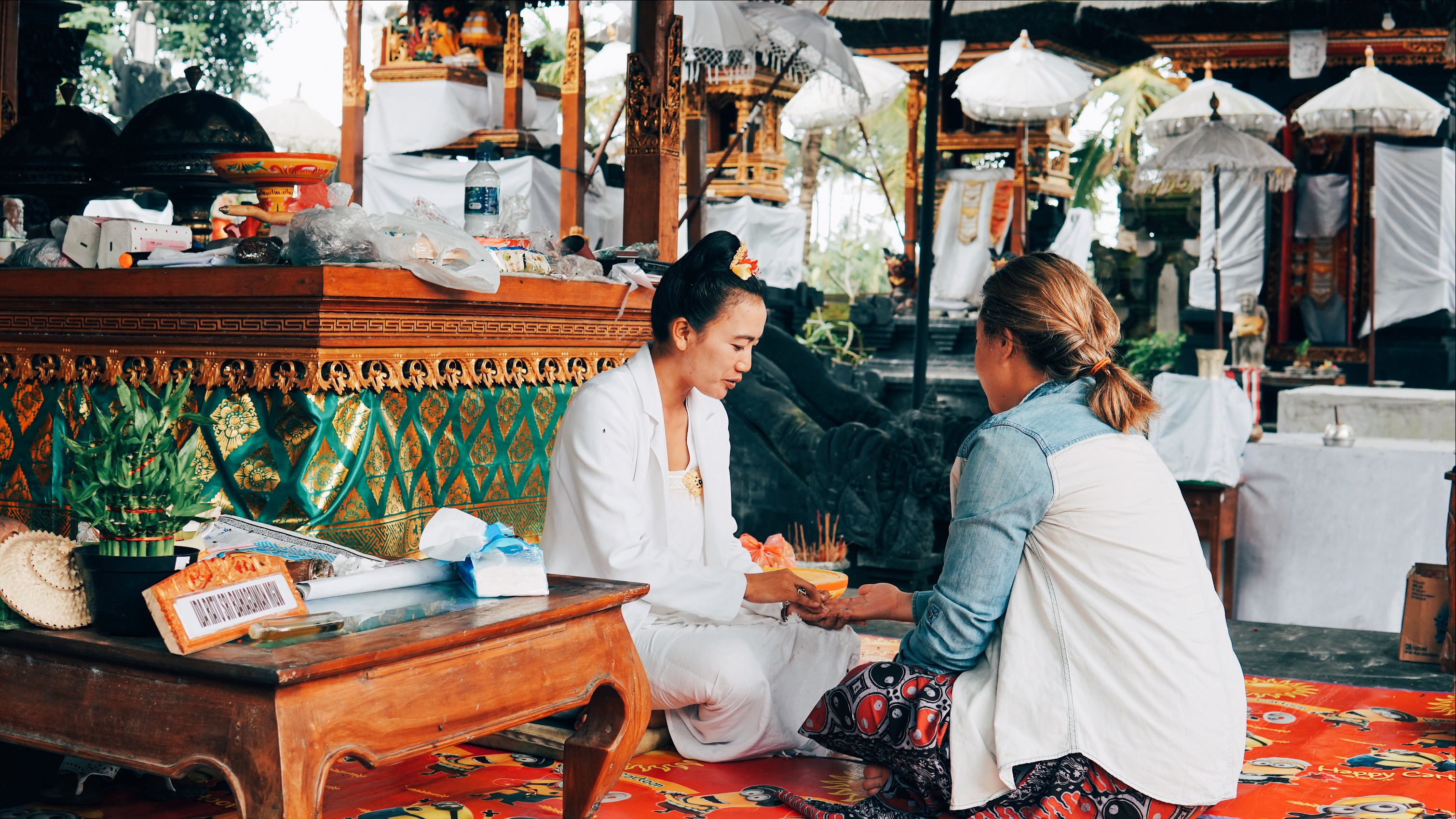Earlier this month, I traveled out of Ubud — Bali’s cultural and spiritual hub, and general hippie haven — and into the island’s rural Bangli regency, to seek out the complex where Balinese Hindu priestess Ida Sri Bhagawan resides.
It was about an hour’s ride through the usual harrowing Denpasar traffic, then through small jungle roads weaving through tranquil Bangli rice paddies to Banjar Bunitin, home to the priestess’ complex. On the premises: a Balinese temple, living quarters, and space for her to host her devotees who come and go. It’s a mind-numbingly beautiful set-up.
I was hoping to get some insight or clarity into the trajectory of my life, from this young woman whom I learned about from — of all places — a Facebook group called “Ubud Community.”
“Visited a healer, done. Thanks.” This simple yet extremely popular post had quickly elicited plenty of likes and dozens of curious inquiries from commenters. Intrigued, I got in touch with the OP, who agreed to take me to a consultation with this same priestess — for a guide’s fee of IDR300k (US$20), which included two types of traditional Hindu offerings, transport, and use of sarong (though I decided to bring my own).
This cost does not include the donation to the priestess. On this front, a visitor can give however much he or she likes. My guide gave me a suggested ballpark figure for standard donations: IDR100k (US$6.75).
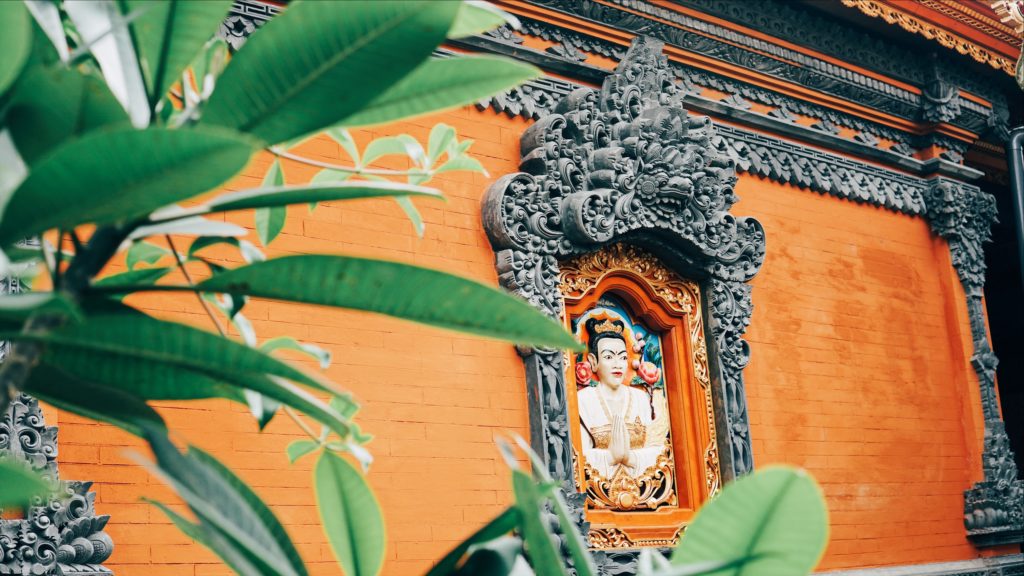
Spiritual counseling is a mainstay in Balinese Hindu culture. Most foreigners seem to know about it through Elizabeth Gilbert’s sessions with the late Ketut Liyer, made internationally famous by her pop culture sensation of a book Eat, Pray, Love — which in turn became a Hollywood hit starring Julia Roberts as Gilbert.
But look past the book and movie, and you’ll find that Liyer has been playfully dubbed “Ketut Liar” by the tourists and local skeptics who have met him. Apparently, he was infamous for offering oddly similar readings on prosperity, love, and family to anyone who came his way. His critics say his fame came from his charm and the company that he provided, rather than his ability to truly tap into the mystical side of things.
I should clarify for the sake of this article, that I’m not Balinese, nor am I Hindu.
However, you don’t need to be Hindu — nor do you need to be all that spiritual — to have your fortune told by a Balinese high priest. But, you do need an open mind to get anything of value out of the experience.
With this in mind, I was curious to see how a meeting with Ida Sri would unfold — many commenters in the same Facebook group had gone to visit her, and stated in the thread that she’s the “real deal.” She does seem to have a large local following, and even the guide who led me to her stuck around after my session for his own reading and healing session with the priestess.
The priestess
Born as a Ketut — the name given to kids born fourth by the Balinese naming system — Ida Sri had no desire or even prospects of becoming a pedanda (high priest). Not from a high caste or a family known for producing priests, things got shaken up when she woke up one day at the age of 27 with what she describes as a case of amnesia. She couldn’t recall any past memories or recognize anyone around her, including her own sister.
At the time, she was just an average white collar worker at a bank in the island’s capital, Denpasar. But, “after being in a trance for days, I awoke and said ‘I am not Ketut anymore, I am Ida Sri,’” the now 34-year-old priestess told me.
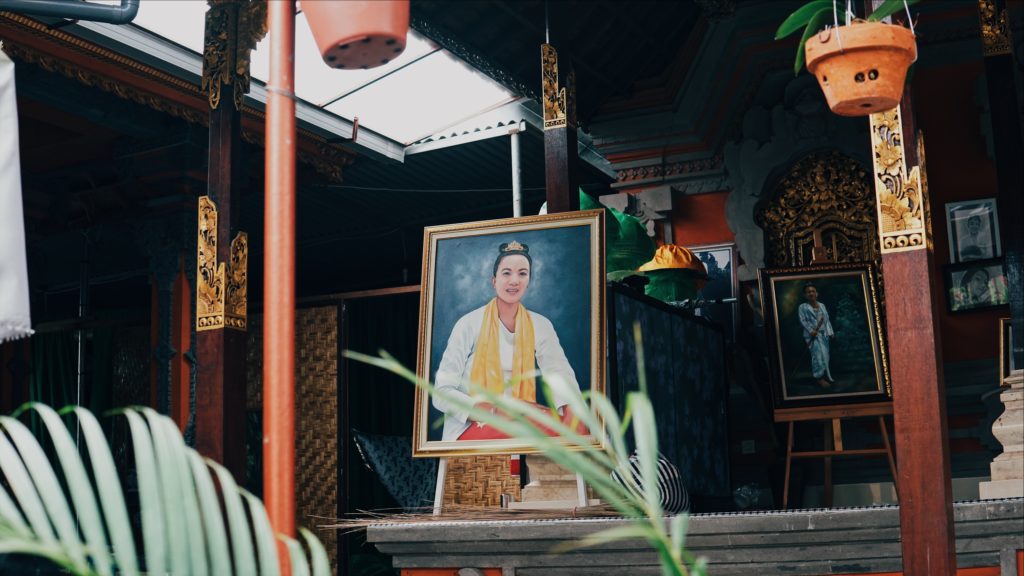
She went through phases where she could speak Chinese and do Buddhist prayers, and suddenly she knew elaborate Balinese Hindu chants that she had no way of knowing. Balinese high priests confirmed the accuracy of these chants and prayers, and ultimately had no choice but to anoint her into priesthood, she explained.
Ida Sri’s story of spiritual awakening and anointment is very similar to that of the prominent priestess Ida Resi Alit, who previously broke a Balinese record by getting ordained at the young age of 21.
However, Ida Sri Bhagawan seems to have a very different approach to things than Ida Resi, now 32-years old. The latter has earned international fame, has a professional website where you can book tickets for a reading, and is currently on a world tour spreading her knowledge of the art of the traditional Balinese mystical ways. She’s was just recently booked for a blessing ceremony event at a church in New York.
Ida Sri, on the other hand, tells me she is content to stay in Bangli and help counsel and heal whoever comes to her (no, she didn’t mention Ida Resi in our time together — the comparison is my own).
She tells me that she often gets elderly people who need a release for their pain, or couples having trouble conceiving. While we can’t confirm this, Ida Sri says on several occasions, these couples have come to her after years of being unable to have children, reporting that, while they don’t always get results right away, six months later, they were able to get pregnant.
“It takes time. I always have to tell them that,” she said.
“I didn’t want to be a priestess, but it’s not my choice,” she told us repeatedly.
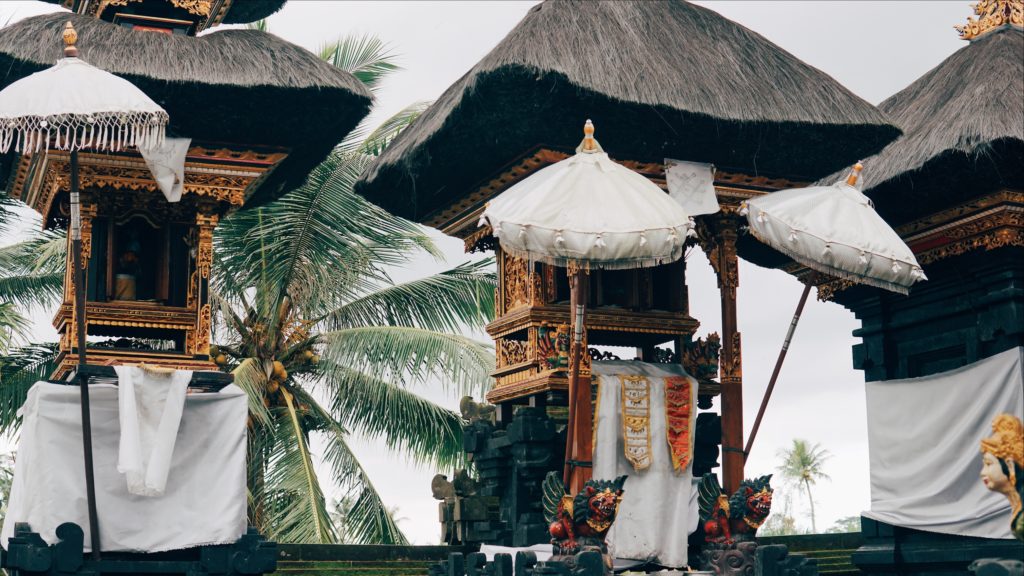
The reading
“What would you like to know?” she asked, as she greeted me with a gentle smile, her eyes inspecting me, scanning my face (and maybe even soul?) for clues on how I was feeling and responding to all of this.
There wasn’t any aspect in my life that was particularly broken at the moment. “I guess, just a general reading to see what comes up,” I answered.
Looking back, this probably threw her off, since most people seem to go in for a session when they have a crisis of conscience or moment of despair to grapple with — some kind of critical cross-path in their lives that would prompt serious soul-searching of this kind.
Should I pack it all up and quit my job and move to Bali? I already did that.
She gently grasped my hand, tracing her fingers down the lines of my palm. “I see you live in an apartment.”
“We actually rent a decent sized house,” I answered.
“With a small garden,” she said, looking up at me for confirmation.
Me: “No, not much of a garden, but there’s a pool.”
“I see there are two chairs in front,” she said.
“No chairs, but we actually have a sofa,” I interjected, hoping she’d move on from this rather misinformed soothsaying attempt at pinpointing the details of my living quarters.
She seemed to get the hint and transitioned, asking me if I was pregnant. After living in Indonesia for so long, where body size and shape are always up for public discussion, let’s just say I’m used to the question and just quipped: “Nope, just chubby.”
“You’re having stomach issues then,” she said.
She wasn’t wrong. I’ve had indigestion, on and off, for weeks at this point, and had suffered a bout of food poisoning just a few weeks before. But also — those of us who have lived here long enough have heard the term “Bali belly” thrown around a lot, for a reason. “Isn’t everyone’s stomach off here?” I wondered.
Next topic.
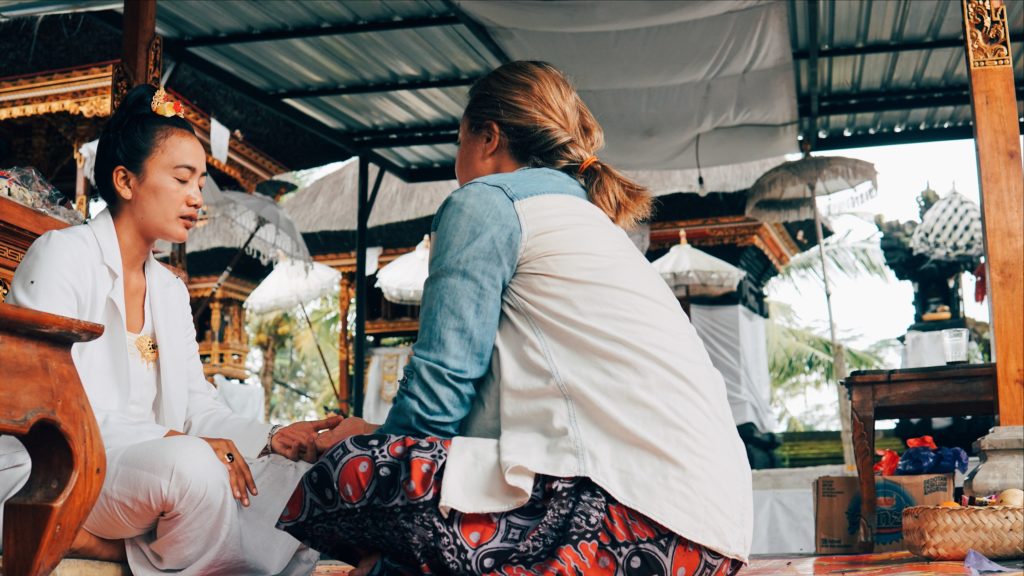
Another close look at my right hand (she never referred to the left one, for some reason): “You’ve been doing a lot of yoga lately. You need to keep doing it — it’s helping you. It’s how you can better communicate with god.”
She wasn’t wrong there, either. Well, except maybe minus that last part. I have been on a serious yoga kick this year: a surf yoga retreat in Sri Lanka, another one in Morocco, and now, regular practice at home here in Bali. The sessions have been helping me immensely in all the stereotypical ways you can imagine: loosening up tight muscles and joints, strengthening and toning my core, honing my ability to be present, and putting the noise of anxiety on silent (if at least for the duration of a 90-minute class).
But once again, it’s Bali. People travel around the world to come here and do yoga. Couldn’t this be true of most people, especially the meandering ones among us?
Suddenly, things took a more serious twist.
“You have enough money. You have love. You have a comfortable life with a good job, yet you feel something’s missing. Don’t you?”
That’s when she went in on me.
“You have friends, but you don’t feel heard. You feel like no one gets it. You feel like you are carrying so much and you can’t share it with your friends.”
Not gonna lie… some tears came out then.
“You need to talk to god. Even if you don’t have anyone, god is there to listen to talk to. That’s why you need to go back to the yoga, as I was saying. That’s how you connect.”
I’ll admit that at the time, this shook me. Afterwards, looking back at this moment, I realize that perhaps she’s just really good at cold reading people. I didn’t bring any serious problems for her to pick apart, no obvious grief or questions needing answered — so, by default, an inner unrest should be a pretty safe bet, right?
Whether you believe in this stuff or not, having someone tell you something so deep and private about you and your inner thoughts is unsettling.
It got a little weird, however, when she started telling me that I’m “not normal” and “gifted.” If you’re not familiar with Indonesian culture, then it helps to state that it’s not uncommon to be deeply religious yet simultaneously obsessed with the paranormal.
“Have you ever seen things that aren’t there? That no one else sees, like ghosts?”
They are trying to communicate with you, but you shut it out, she told me. The priestess explained to me that when I got smacked in the face by my own surfboard earlier this year, it happened not because I’m a lower-intermediate surfer trying to progress too quickly (my explanation) — but because I didn’t have permission to be there from whatever entity was there when it happened (her explanation).
“Just wait, maybe you don’t believe me now, but you will see,” she insisted.
“You have some dark energy, you,” she added.
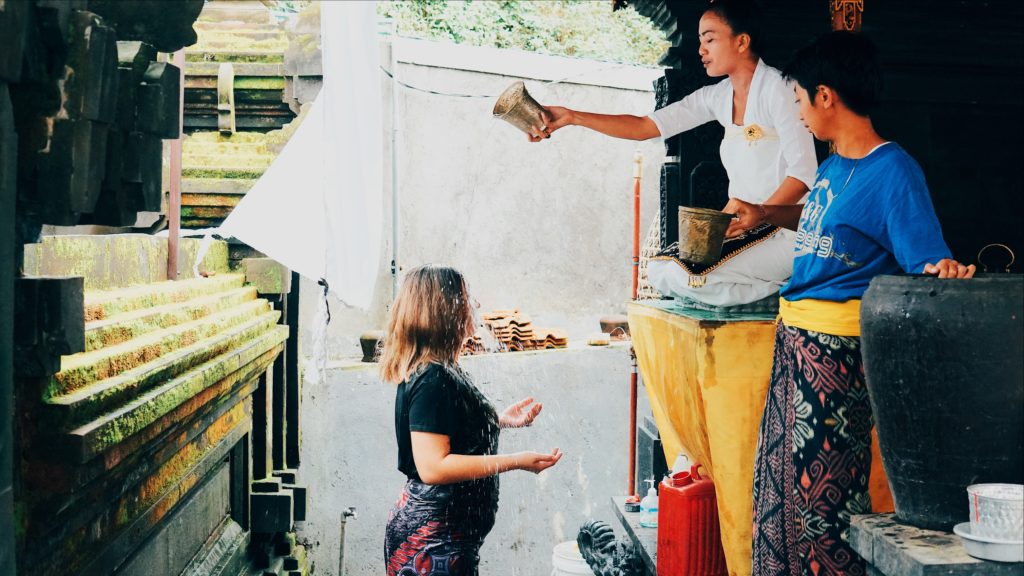
The Melukat Ritual
We wrapped things up accordingly with a melukat ceremony, the Balinese cleansing ritual whereby a gallon or so of holy water gets dumped over you as the priest chants while ringing a bell. It’s meant to expel any bad juju clinging on to your soul.
The ceremony gets sealed with the tying of the purified tridatu yarn — those red, white, and black bracelets you see on every other Balinese person’s wrist. They symbolize the gods Brahma, Wisnu, and Siwa, and the values that each of those gods represents.
The ritual itself left me feeling… very cold. That, and short of breath as each pail of water was poured over my head. The best way to describe it is getting caught out in the ocean, as you gasp for breath between oncoming waves.
After it was all over, Ida Sri answered my questions about her (most of which were about her personal background, detailed earlier in this article). She could tell that I was curious about her, and was gracious and forthcoming about it in her responses.
It wasn’t until I got home that I really got to contemplate what to make of the experience. Coming from a confused combination of atheism and agnosticism (I had a strict Catholic upbringing — make of that what you will), I had gone into the session skeptical, yet very much open-minded about what may come. I reminded myself that Ida Sri is, after all, a priestess — so it’s unsurprising that she thinks that this belief in god is what my big struggle, that crucial missing piece in my life, comes down to. Once again, I’m still not sure if god is the answer here, but it did provide me with some much needed personal reflection.
She didn’t get everything about me right, but her comments on my general headspace definitely prompted some shudders in me. She shook me, but in a good way — and I’m glad for it.
